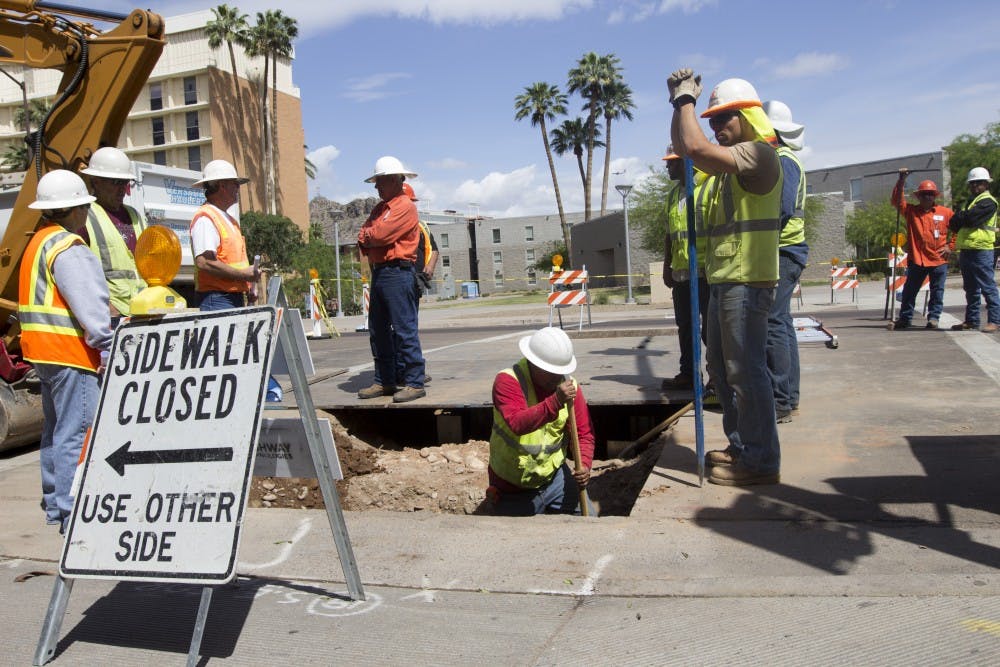 Construction workers excavate a piece of road near campus.The Tempe City Council’s decision to resurface Rural Road will
Construction workers excavate a piece of road near campus.The Tempe City Council’s decision to resurface Rural Road willextend traffic delays in the area to early November instead of the
end of October. (Photo by Dominic Valente)
The Tempe City Council’s decision to resurface Rural Road will extend traffic delays in the area to early November instead of the end of October.
During a formal city council meeting on Sept. 19, the council awarded a $1.2 million construction contract with a 7-0 vote that will resurface Rural Road from Alameda Drive to Rio Salado Parkway.
Transportation Maintenance Manager Isaac Chavira said the project began Sept. 23 and is working on sidewalk ramps as of now.
“We should be finalizing the project Nov. 2, assuming weather is on our side and there are no delays,” Chavira said.
In addition to the paving project occurring on Rural Road, Tempe has been in the process of installing new water infrastructure between Apache Boulevard and University Drive and should be done by the end of October, according to the city of Tempe’s website.
Tempe spokeswoman Sue Taaffe said the contractors Achen-Gardner Construction LLC, which oversees the water project, and Nesbitt Contracting Co, handling the paving project, are committed to getting all the work done along Rural Road by the estimated timeframes.
“Everyone is doing their best to coordinate and keep traffic flowing,” she said.
Rural Road will continue to have lane restrictions in each direction from south of the Union Pacific Railroad to University Drive until Oct. 1, Taaffe said.
The remaining water meter installations will continue through October and cause some restrictions around the ASU campus on Apache Boulevard, Rural Road, Mill Avenue and University Drive, Taaffe said.
“The city will make every attempt to keep two lanes open in each direction when possible,” she said.
Taaffe said the paving construction will restrict lanes in both directions on Rural Road between Alameda Drive and Rio Salado Parkway until early November.
Electrical, computer and energy engineering senior Ellen Bulka said she walks the area often to get to and from classes.
“(The traffic) is not fun, especially when it’s q0 degrees outside,” she said.
Bulka said she also drives the area daily to get to work and experiences many more delays driving than walking.
Business communications senior Garrett Arford said he only walks the area, unless he is driving with friends.
“There’s a lot of traffic,” he said. “It’s really annoying.”
Arford said even though the current traffic is frustrating, he is not upset with the resurfacing extending the traffic’s end time.
In a city of Tempe document requesting council action, Public Works staff identified the section on Rural Road as a high-maintenance priority for resurfacing.
The document explains Rural Road’s asphalt, between Alameda Drive and Rio Salado Parkway, has reached the end of its useful life.
The city chose Nesbitt Contracting Company to do the paving project based on a bidding among six construction companies conducted on Aug. 27, according to the city document. Nesbitt Contracting had the lowest bid by $40,000.
Although the project is estimated to be completed by Nov. 2, Chavira said the thermo striping will continue 30 days after.
“You won’t even know,” he said. “It’s all night work.”
Chavira said it mainly involves crosswalks, and it requires no need for traffic controls.
Reach the reporter at jmhobbs@asu.edu or follow her on Twitter @jamiemhobbs




